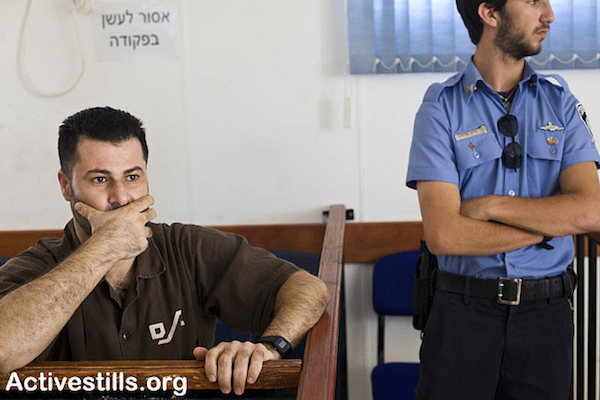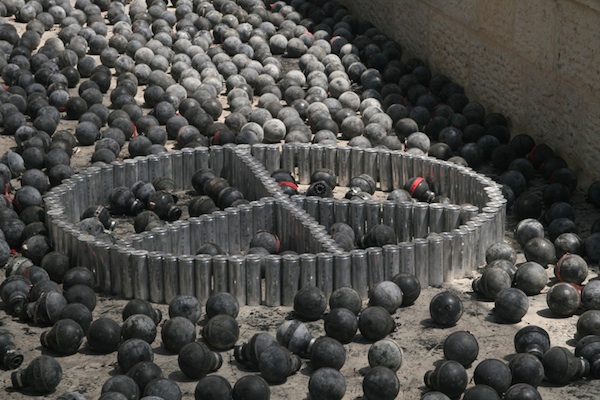Israeli military court convicts Abdullah Abu Rahmah of obstructing a bulldozer building the separation barrier. His previous trial and imprisonment was followed closely by western governments.

Abdullah Abu Rahmah, one of the central organizers of the popular resistance protests against the separation barrier in the West Bank village of Bil’in, was convicted of obstructing the work of a soldier by an Israeli military court this week. He will likely be sentenced to four months in prison.
Abu Rahmah, who was recognized by the European Union as a “human rights defender” dedicated to non-violence, previously served over a year in prison for organizing “illegal marches” as well as for “incitement.” All political demonstrations are illegal for Palestinians under Israeli military law.
+972 named Abu Rahmah “person of the year” in 2010. The choice was made, we wrote at the time:
Because he has become the face of the grassroots, unarmed resistance movement to Israel’s security barrier; because he is the person who has raised international awareness not only of the devastation caused by the barrier, but also the existence of a well-organized, non-violent grassroots opposition movement – one that brings together Palestinians, Israelis and international supporters in a joint struggle. Because he is the answer to the question, “Where is the Palestinian Gandhi?” (answer: there are many; and they are languishing in Israel’s jails). Because he has never wavered in his commitment to non-violence – not even after his cousin Bassam Abu Rahmah was killed by a high-velocity tear gas canister shot by Israeli soldiers directly at his chest; nor after his cousin Adeeb Abu Rahmah was arrested and imprisoned for participating in weekly demonstrations against the barrier that separates the people of Bil’in from their own farmland.
Among other things, Abu Rahmah was arrested in the past for possession of spent tear gas grenades the Israeli army shot at protesters in Bil’in. The indictment, in which he was not convicted, referred to the used grenades as “weaponry.”

This week Abu Rahmah was convicted by a military court of obstructing the work of a soldier. The incident occurred in 2012 when he attempted to stop a bulldozer from clearing the route for the construction of a fence in the Beitunia area of the West Bank. According to AFP, Abu Rahmah’s conviction will include a four-month suspended sentence for an arrest in 2009, in addition to another that the court will decide on in the beginning of December.
Abu Rahmah’s attorney, Gaby Lasky, told AFP that the conviction is part of the army’s continual harassment of non-violent activists. The indictment is politically rather than criminally motivated, she added.
Regarding Abu Rahmah’s previous arrest, it is important to clarify that any and all Palestinian protests in the West Bank are illegal under Israeli military law. Therefore, any march is also deemed illegal. In addition, the crime of “incitement” does not necessarily refer to incitement to violence, but rather to any form of demonstration or protest.
Related:
+972 Magazine’s 2010 Person of the Year: Abdullah Abu Rahmah
PHOTOS: What the press missed in Bil’in tear gas flower garden
WATCH: Hundreds commemorate nine years of popular struggle in Bil’in
A version of this article was first published on +972’s Hebrew-language sister site, Local Call. Read it in Hebrew here.

